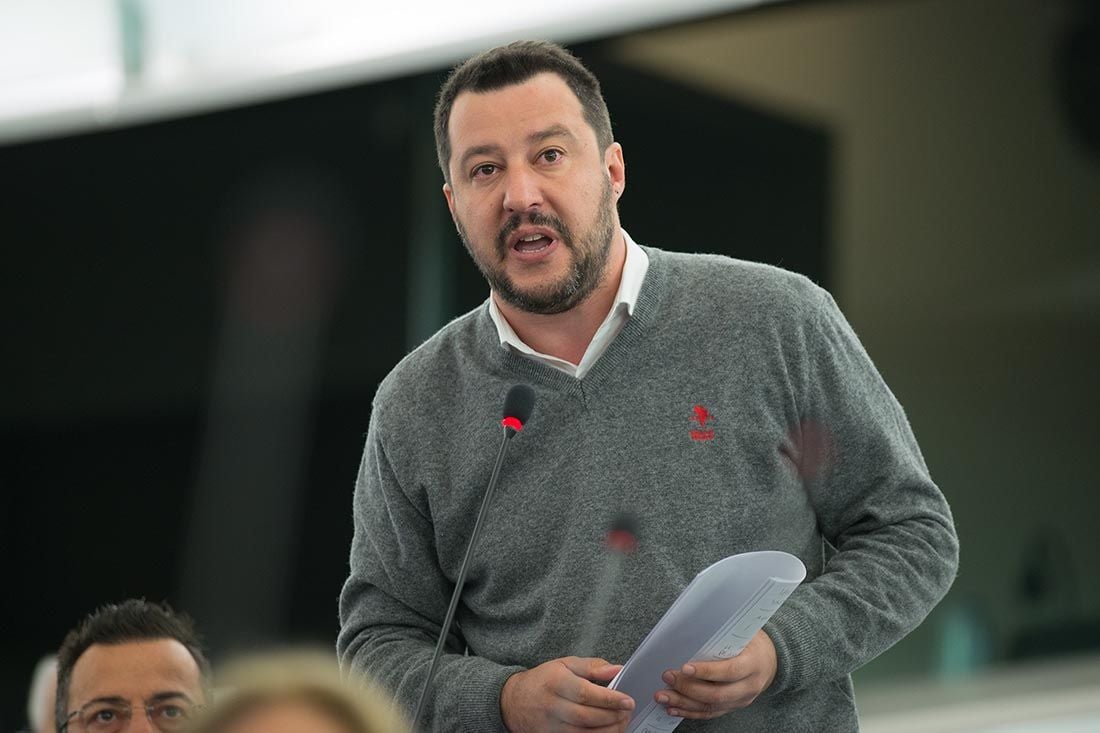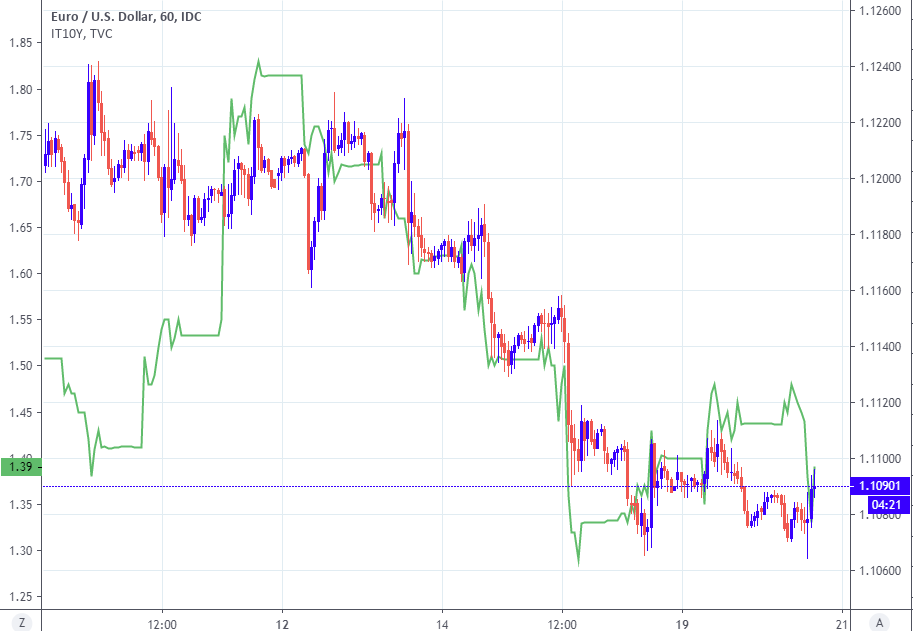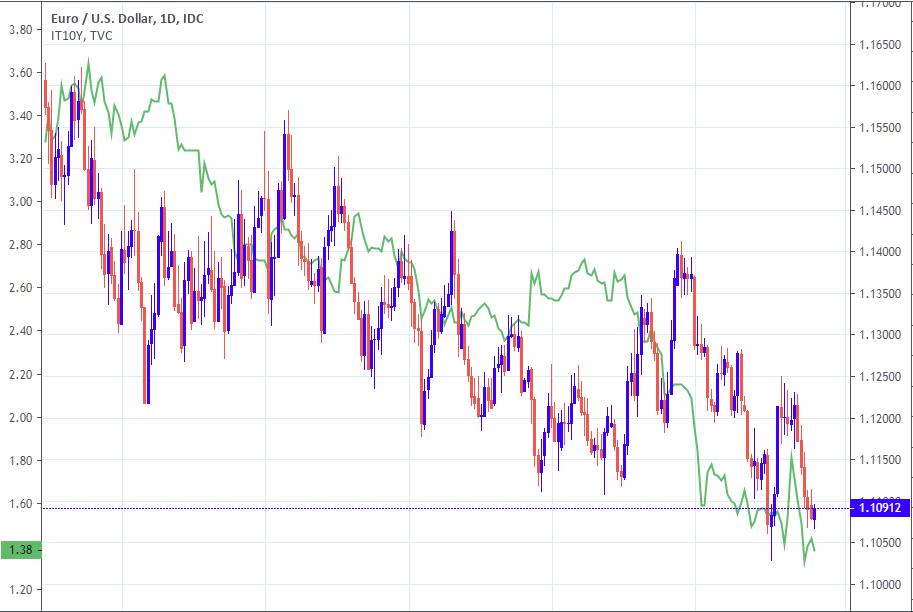The Euro-Dollar Rate Holds its Nerve after Italian Government Falls, Markets Eye Scope for a Technocratic Takeover
- Written by: James Skinner

© European Union - European Parliament, reproduced under Creative Commons licensing
- EUR creeps higher, yields slip, after Italian coalition gov falls.
- Market hopes for technocrat to keep Salvini's The League out.
- But coalition's executioner is riding high in Italian opinion polls.
- Analysts say Salvini likely to govern again if snap election held.
- Second Salvini Gov sure to clash with EU over spending rules.
The Euro-Dollar Rate pared an intraday loss and climbed higher in late noon trading Tuesday even after Prime Minister Giuseppe Conte announced his resignation on the floor of the Senate, consigning the economy to limbo as President Sergio Mattarella attempts to find a way forward.
Prime Minister Conte resigned after deputy PM and leader of The League, Italy's largest political party with some 40% support in recent opinion polls, went ahead with a motion of no confidence motion in the government of which he is a part. The move follows months of infighting between The League and coalition partners, M5S (Five Star Movement), with the latest skirmish being over an infrastructure project that was opposed by the latter.
Conte's resignation now opens the door to a process that will see President Sergio Matarrella sound out the various factions in the parliament with a view to seeing whether a 'caretaker' government, otherwise known as a technocratic or unelected government to see out the remainder of the term. If such a coalition cannot be cobbled together between the President, M5S and the defenestrated PD (Democratic Party) then a snap election will have to be called.
Aula, la seduta è aperta????Comunicazioni del Presidente del Consiglio @GiuseppeConteIT → https://t.co/oLLmWUm2i2 Diretta su #SenatoTV????→ https://t.co/zT1kVuSJvR E su #SenatoInstagram → https://t.co/UYuyGPYYLF #OpenSenato pic.twitter.com/JtR1mFOGMn
— Senato Repubblica (@SenatoStampa) August 20, 2019
"Opinion polls suggest that elections would usher in a new government dominated by the League, which we suspect would be even more likely to clash with the EU than the current one. Nonetheless, financial markets responded favourably to the news, with the 10-year Italian government bond yield down by a few basis points on Tuesday," says Melanie Debono at Capital Economics.
The Euro continued to edge higher following the announcement and Italian government bonds, which are the safe-haven asset in the domestic market, sold off. Price action could suggest a tacit hope among investors that a technocratic government can be pulled together and spare the markets as well as budget hawks in Brussels the experience of an Italian government led this time by League-leader Matteo Salvini and backed by either an absolute majority or a more natural coalition partner.
Salvini's government, which was led by the external appointment that was both Conte and a compromise arising from coalition negotiations as well as talks with Mattarella, has repeatedly clashed with the EU over the last 16 months over spending pledges contained in The League manifesto. EU fiscal rules require Italians, who were offered something different and to the contrary by Salvini, to live with a continuous diet of austerity.

Above: EUR/USD rate, shown at hourly intervals, rises as IT 10-year yield (green line, left axis) falls.
Established parties of old were swept aside in an anti-establishment wave of rebellion in the March 2018 general election that saw the vote share of the PD, Italy's last government, fall from over 25% to just less than 19%. Meanwhile, the centre-right Forza Italia led by scandal-plagued former PM Silvio Berlusconi, slumped from more than 20% to just 13.9%.
Coalition partner M5S secured 32.2% of the vote, up 6.6% from the previous election, while The League rose from 4.1% to 17.6%. The result left two relatively new parties inches from half of the entire national vote, with the parties of old vanquished and then routed to the sidelines of the political field.
"An election is not a done deal. The 5 Star Movement (the other coalition party) could form a government with Democratic Party. As a result, the FTSE MIB is clawing back earlier losses after rebounding off the 200-day moving-average, a key level which has offered support to the FTSE MIB on several occasions since February. Bond yields are falling and banking stocks are clawing back some of the 3% losses," says Fiona Cincotta, chief market analyst at City Index. ""However, this is by no means the end of the political disruption in Italy."
The prospect of an even stronger mandate for Salvini and the controversial League comes at a bad time for the Eurozone economy, which slowed sharply in the second quarter and is expected to have weakened further in the third quarter. Weakness comes amid a litany of external challenges including the U.S.-China trade war, which has badly wounded the German economy, an ongoing trade skirmish between the EU Commission and White House as well as the ever-present risk of a 'no deal' Brexit.

Above: EUR/USD rate, shown at daily intervals, rises as IT 10-year yield (green line, left axis) falls.
"We are inclined to believe that the ECB will double-down with both rate cuts and more QE next month, a forecast that is supported by recent comments from ECB officials," says Claus Vistesen, chief Eurozone economist at Pantheon Macroeconomics. "We think the central bank will cut its deposit rate by 20bp, to -0.6%, and launch a new QE program to the tune of €30-to-40B per month, split evenly between non-financial corporate and sovereign bonds."
Growth has slowed more in the Eurozone than it has in either the U.S. or China as a result of the trade conflict, with the German industrial sector having fallen in the second half of 2018 into a recession that has only grown deeper as the 2019 year draws on. The trade war is now widely expected to get worse before it gets better, with September 01 and December 15 both dates for a likely escalation.
All of these factors are weakening the Eurozone growth pulse and pushing the European Central Bank's long-elusive inflation target of "close to, but below 2%" further from view, which is why the bank said in July that it's tasked staff with devising a "tiered system for reserve remuneration" and considering "options for the size and composition" of a new quantitative easing program.
"The events could trigger an early election as soon as the middle of October which would be the worst outcome for the euro. The Northern League are likely to form a new coalition government if an election is held, and have proposed to loosen fiscal policy further next year which would again put Italy on a collision course with the EU," says Fritz Louw, an analyst at MUFG.
Time to move your money? Get 3-5% more currency than your bank would offer by using the services of foreign exchange specialists at RationalFX. A specialist broker can deliver you an exchange rate closer to the real market rate, thereby saving you substantial quantities of currency. Find out more here.
* Advertisement




